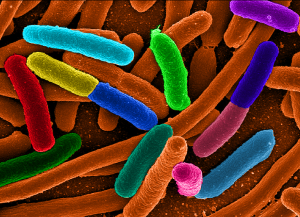
E. coli Bacterial Contamination: What are the Health Risks?
By Dan DeBaunShare
There have been a series of health scares related to E. coli bacterial contamination across the country in the past few weeks including recalls of ground beef, hamburgers, sprouts and hummus products. In the latest incident, the Portland Water Bureau issued a Boil Water notice, urging the approximately 670,000 people affected to boil water used for drinking, brushing teeth, food preparation or making ice, after three water samples tested positive for traces of E. coli bacteria.
The timing of the Portland Water scare coincided with the Rose Festival City Fair along the Portland waterfront, and thus also negatively affected vendors, who were instructed to dispose of any food and/or drink products that contained tap water due to concerns that the water may be contaminated. According to a CNN report, municipal reservoirs have since been cleaned and disinfected, however, the source of the contamination is still unknown.
According to the Center for Disease Control (CDC) there are several strains of E. coli bacteria, and while most are harmless, some strains produce Shiga toxin – referred to as Shiga toxin-producing E. coli (STEC) – which causes disease in humans. In the US there are around 265,000 STEC bacterial infections every year, with E. coli O157:H7 being the most prolific strain, causing more than 36% of all bacterial infections.
People of any age can become infected, but children under 5 years, the elderly, and those with compromised immune systems are most vulnerable to developing severe symptoms upon contracting the disease. Symptoms of a bacterial STEC infection include diarrhea, stomach cramps and vomiting, and vary in severity with some being mild while other infections may be life-threatening. Between 5-10% of people who contract a STEC infection develop hemolytic uremic syndrome (HUS), a complication that requires immediate medical attention, as it can result in permanent kidney damage, or worse still, kidney failure and death.
How is E. coli Transmitted
Disease causing E. coli bacteria can be transmitted via ingesting contaminated food or water, through contact with human or animal feces, or direct contact with people or animals that are infected with the bacteria. Drinking water may become contaminated if human or animal feces gets into the water supply. E. coli bacteria is also used as a marker to indicate water contamination in municipal drinking water systems, as even if the strain of E. coli itself is not harmful to humans, their presence is an indication that the water has not been adequately sanitized and could pose a health risk.
Preventative Measures
The CDC recommends taking the following precautions to prevent E. coli infection:
- Practice Good Hygiene – Always wash your hands after changing your baby's diaper or using the bathroom, as well as after touching animals, cleaning animal pens/cages, or coming in contact with an area where animals are housed, such as petting zoos, farms, fair grounds, or even your own pet's living quarters.
- Keep food preparation areas clean by washing hands, counter-tops, cutting boards and knives or other utensils used when handling, preparing or cutting raw meat.
- Avoid eating raw meat – Ensure that meat, particular ground beef, is well-cooked.
- Avoid raw (unpasteurized) milk, dairy products and fruit juices such as apple cider.
- Try not to swallow water when playing or swimming in lakes, streams, ponds, or man-made swimming pools.
If drinking water is contaminated, boil the water to a rolling boil to kill off any bacteria that may be present, or filter the water using a good quality filter that is capable of removing bacteria.
-
Regular price $234.00 USDRegular priceUnit price / per
-
Regular price $327.00 USDRegular priceUnit price / per
-
Regular price From $367.00 USDRegular priceUnit price / per
-
Regular price From $408.01 USDRegular priceUnit price / per
-
Regular price From $451.00 USDRegular priceUnit price / per
-
Regular price From $478.00 USDRegular priceUnit price / per
-
Regular price $332.50 USDRegular priceUnit price / per
$350.00 USDSale price $332.50 USDSale

Dan DeBaun is the owner and operator of Big Berkey Water Filters. Prior to Berkey, Dan was an asset manager for a major telecommunications company. He graduated from Rutgers with an undergraduate degree in industrial engineering, followed by an MBA in finance from Rutgers as well. Dan enjoys biohacking, exercising, meditation, beach life, and spending time with family and friends.
~ The Owner of Big Berkey Water Filters
















